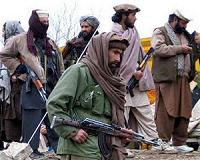| . |  |
. |
Beirut, Lebanon (UPI) Apr 26, 2010 The European Union plans to get together with the United States next month to hammer out a new pact to disrupt the financing networks of al-Qaida and other terrorist organizations. The U.S. Treasury Department has been able to score notable successes against al-Qaida, Hezbollah, Hamas and other groups by targeting these networks. But it has long complained that it is not getting the cooperation it needs from the Middle East and Asia to deliver a critical blow. A trial under way in Indonesia, the world's most populous Muslim nation, of a Saudi Arabian accused of financing a militant group illustrates the challenges involved in shutting loopholes exploited by the terrorist factions and their shadowy facilitators on a global scale. Ali Abdullah is charged with providing 54 million rupiah -- about $6,000 -- to a terrorist faction linked to Jemmah Islamiah, an al-Qaida affiliate and the main jihadist group in Southeast Asia, and with raising money in Saudi Arabia to support terrorism in Asia. He claims he is innocent. His trial is providing a glimpse of the ever-mutating financing network from the Gulf to the Far East and the immense difficulties the Americans and their allies face in tearing it down. This is particularly moot as the clandestine bankrolling of Islamist groups in Afghanistan and Pakistan, now the main battleground in the war against terror, swells and makes the need for concerted action more pressing. In the aftermath of the Sept. 11, 2001, al-Qaida attacks on the United States, Saudi Arabia, a longtime U.S. ally, was accused of allowing the financing of Islamist militants. Other Gulf states, such as the United Arab Emirates -- in particular its freewheeling financial hub, Dubai -- were also branded as key conduits for global terrorist financing. Riyadh denied these allegations but U.S. and European intelligence services have repeatedly claimed that wealthy Saudis, including members of the royal family, were surreptitiously funding al-Qaida and its offshoots, often through Dubai. The U.S. Government Accounting Office declared in September that the Saudis had made significant progress in the war against terrorism, including shutting down financial conduits to al-Qaida from individuals and charities. The GOA stressed there was no indication that the Saudi government was providing funds but warned that much more needed to be done by Riyadh to curb the clandestine bankrolling of terrorism. "It is vital that the U.S. demand more from the Saudi government in cutting off the money flow to the Islamist extremist network," said U.S. Rep. Ileana Ros-Lehtinen, R-Fla., the ranking Republican on the House of Representatives Foreign Affairs Committee. Last June 14, security authorities in Yemen, Saudi Arabia's southern neighbor and a hotbed of al-Qaida activity, announced the capture of a Saudi named Hassan bin Hussein Alwan, allegedly al-Qaida's biggest financier in Yemen and Saudi Arabia. But in the meantime, another Islamist organization called Lashkar-e-Toiba, largely based in Pakistan, is increasingly spreading its tentacles and in some quarters is seen as a possible global rival to al-Qaida. Lashkar-e-Toiba, known as LeT, was behind the November 2008 carnage in Mumbai and is believed to be plotting similar high-profile attacks financed in the Gulf. LeT is reported to have funneled large amounts of money through its Gulf-based networks to fund jihadist operations in India. The Jamestown Foundation, a Washington think tank that monitors global terrorism, reports that LeT has established networks in the Gulf states. "Investigating agencies have now confirmed that LeT is working on a new strategy which involves using Dubai as the center of planning for future strikes against India," it said. The arrest of several LeT-linked financiers exposed the scope of the group's financial web in the Gulf. "With this threat in view, India is now seeking a comprehensive anti-terrorism treaty with the Gulf nations," Jamestown observed. Counter-terrorism specialists say that while the Saudis have made progress in cutting off terrorist financing, those gains are undermined by the failure of other Gulf states to crack down. "Financing terrorism is not institutionalized any more in Saudi Arabia," one Western official in Riyadh commented. "We're concerned that the main finance activities are shifting to countries perceived as tolerant by the West, like Dubai and Qatar, because they did not face the same scrutiny as Saudi Arabia."
Share This Article With Planet Earth
Related Links The Long War - Doctrine and Application
 As al-Qaida expands, enter Ilyas Kashmiri
As al-Qaida expands, enter Ilyas KashmiriBeirut, Lebanon (UPI) Apr 20, 2010 Amid the growing concerns of Western intelligence services that al-Qaida appears to be building up its capabilities in Yemen and Somalia, the focus is increasingly on one man in the jihadist leadership: Mohammed Ilyas Kashmiri. He commands al-Qaida's elite and infamous Brigade 313, named after the number of supporters who stood with the Prophet Mohammed in a seventh-century battle and d ... read more |
|
| The content herein, unless otherwise known to be public domain, are Copyright 1995-2010 - SpaceDaily. AFP and UPI Wire Stories are copyright Agence France-Presse and United Press International. ESA Portal Reports are copyright European Space Agency. All NASA sourced material is public domain. Additional copyrights may apply in whole or part to other bona fide parties. Advertising does not imply endorsement,agreement or approval of any opinions, statements or information provided by SpaceDaily on any Web page published or hosted by SpaceDaily. Privacy Statement |